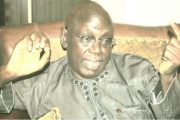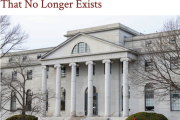The idea of Nigeria as a collapsing edifice is increasingly being re-asserted across many frontiers, mainly civil society platforms where plausible ways forward for Nigeria are being explored. The frequency of that assertion is not merely coming to terms with what is generally described as unbelievable degree of system dysfunction but also works for the discursive condition of emergence of a new social order in the country.

Prof Jega
Bayero University, Kano political scientist, Prof Attahiru Jega, is the latest voice to push that position when he served as Chairman of a Nigeria Labour Congress, (NLC) event tagged 2022 Workers’ Political Conference organized March 2nd, 2022 in Abuja
Below are nuggets of the Jega lens on the disaster waiting to happen and what, precisely, is to be done. They are all taken from his remarks as the Chairman of the occasion and are, therefore, from the horse’s mouth:
“The sorry state of the socioeconomic conditions under which the Nigerian working people, indeed the overwhelming majority of all citizens live and work, the reckless misrule and mis-governance by a tiny, rabid and reckless band of elite, and the manner by which these myopic, ‘elected’ so-called ‘leaders’ and their collaborators, have devastated the Nigerian economy, heightened insecurity, and virtually destroyed the basis for national cohesion and integration, Nigeria, as a potentially great nation, is crying for a rescue mission, before it is too late.
… Nigeria is currently, essentially at crossroads, as the country prepares for the 2023 general elections. Nigerian citizens generally, and the working people in particular, can either continue play the Ostrich on the current trajectory of reckless, senseless, visionless journey towards democratic and socioeconomic development, and allow the country free-fall to imminent self-destruction, which is clearly in sight, OR they have to wake up, rise and join hands in solidarity for struggles and active engagement in the political process towards, national emancipation from a devilish alliance of exploiters, both internal and external, evidently hell-bent on not only eroding Nigeria’s natural potentials but also destroying it.

Cde Ayuba Wabba, President of the NLC
… Most analysts are agreed that while Nigeria may not have totally collapsed, it is in the process of collapsing, as reckless elite in control of the governance process are blindly running the country aground. And the 2023 general elections may be the ‘make or break’ epochal moment. Given this, all hands of progressive forces need to, have to, be on deck to prevent our country from imminent collapse, and to turn it around on to a trajectory of good democratic governance for beneficial democratic, socioeconomic development, and human security for Nigerian citizens. A broad alliance of progressive forces for national rescue and emancipation is absolutely required to get Nigeria out of the current unwholesome predicament in which it finds itself.
… If anything, the current Nigerian situation amply illustrates the fact that unless larger issues of leadership integrity, leadership recruitment and good, democratic governance are squarely addressed, even narrow struggles on workers particularistic economic struggles become very difficult if not impossible to wage successfully.
… In a situation in which a tiny band of ruling elite is running the country aground, a rescue and emancipatory mission from their strangle-hold assumes primacy. It is perhaps if not the only, then the best way, short of a revolution, to improve governance and quality of leadership for good, democratic governance, which in turn, would create a better environment for protecting, advancing, and defending the overall interest of the working people. A revolution may, indeed be desirable under the circumstances, but given the current realities, it is far-fetched. Broader patriotic and emancipatory struggles for good democratic governance may under the circumstances, help rescue the country and reposition it towards satisfaction the fundamental needs and aspirations of all citizens, and improving the scope and space for working peoples’ struggles for improvement in their wages, working and living conditions.
… Therefore, I humbly suggest that, NOW, preparatory to the 2023 general elections, is the time to effectively mobilize, conscientise and involve Nigerian workers in broader political engagements towards using the electoral process to improve the leadership recruitment processes, elect good and popular representatives in governance, and by so doing, catalyse good democratic governance, which would certainly be in the overall, long-term interest of the Nigerian working people. Nigerian working people and their organizations, trade unions and working-class movements, must necessarily join hands and work together with credible patriots in professional associations, civil society organizations and students and women groups, bring about remarkable improvement in our politics and governance as we inch towards the 2023 general elections. The minimum agenda would be to improve the integrity of the Nigerian electoral process; to demand for reforms to expand the scope of transparent democratic participation within political parties; and improve the processes of selection, fielding and election of candidates into positions of leadership in governance at all levels – local, state and national/federal. The task is to ensure that either a working people – oriented political party with a popularly acceptable programme fields good, competent and credible candidates, or in general, only candidates who have integrity, competence and who meet people-oriented selection criteria are elected into executive or legislative positions in governance.
… The deliberations at this conference, guided by the lead paper presentation and panel discussion, should help us chart a course for a reinforced commitment to national emancipation and more active engagement participation of Nigerian workers in our current and future political processes”




























